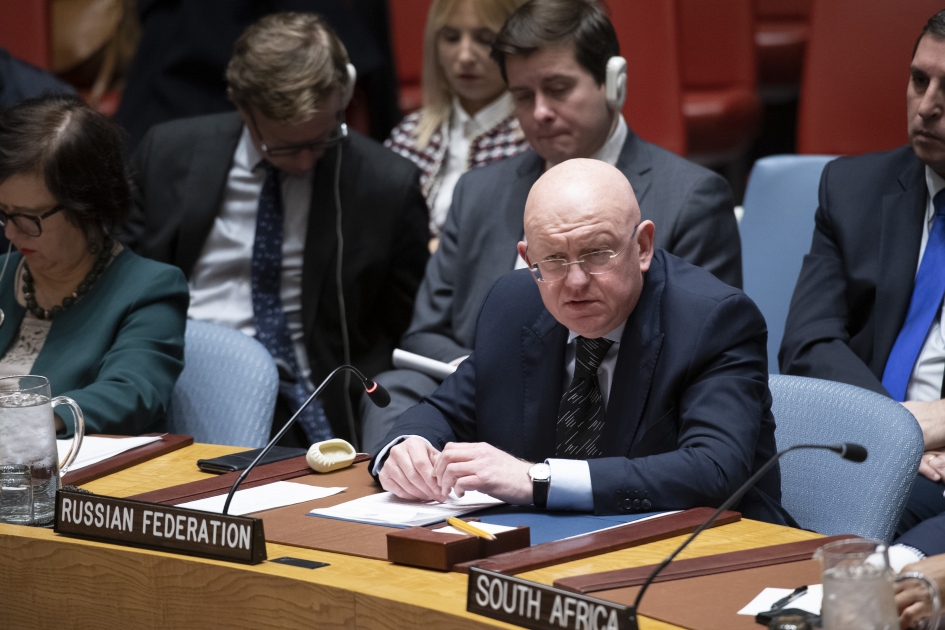Statement by Permanent Representative Vassily Nebenzia at a UN Security Council briefing on the situation on the Korean Peninsula
Mm. President,
Many who spoke today mentioned the role of the Security Council. We consider this meeting as an opportunity to review the results of the Council’s work on implementation of its decisions with regard to searching for political and diplomatic solutions to the problems of the Korean Peninsula over the recent 2 years. Unfortunately, there is little to discuss, because in the course of this 2-year period the Council failed to negotiate any meaningful steps.
Ever since positive momentum emerged in dialogue between the U.S. and the DPRK, as well as in inter-Korean reconciliation, Russia, China, and other UNSC members have repeatedly tried to initiate some positive reaction of the Council to these developments. Remember: as recent as last year we talked about prospects to achieve the long-awaited peace and rapprochement of the North and the South. However, the Council could produce no reaction to support the positive dynamic in the settlement – for some obscure reasons all attempts were blocked.
Meanwhile the inter-Korean dialogue withered away, the U.S.-DPRK dialogue is stagnating. Sanctions cannot substitute for diplomacy, negotiations is a “two-way avenue”. You cannot make an agreement if you give nothing in return. No one doubts that the DPRK possessing a nuclear and missile program is unacceptable. However, can we count on any progress if Pyongyang is called to unconditionally abide by all demands in return for promises of future benefits?
We stated many times that path towards de-nuclearization not only of the DPRK, by the way, starts with confidence-building measures.
Institutes and mechanisms of the United Nations and its Security Council should become aid to settlement and inter-Korean dialogue rather than impediment to them. Only then we will be able to speak about effective resolution of the problems of the region (including the nuclear problem) on the basis of dialogue and mutually-acceptable agreements. One cannot reach this by sanctions and pressure alone. Besides, what is needed is a roadmap of step-by-step relief of restrictions. Excessive use of UNSC sanctions toolkit has caused member states and international organizations, including the UN itself, often to have no opportunity to maintain humanitarian, diplomatic, and sports-related ties with the DPRK in normal mode, though these areas have nothing to do with development of nuclear and missile programs.
The so called “autonomous” and secondary sanctions against the DPRK that are introduced in circumvention of or in addition to the UNSC sanctions also produce a negative impact. Unilateral restrictions both defy sovereignty and legitimate interests of member states and run counter to the norms of international commerce, and also undermine integrity of restrictions that have been agreed by the Security Council. Once again, we call upon the United States and other countries to give up unilateral restrictions. The case of the DPRK is quite indicative in this regard. What is not banned by the UNSC sanctions regime is nevertheless hard to do because there are those illicit practices and because entrepreneurs fear they might get onto black lists. Attempts to “bless” such restrictions by the authority of the UNSC or its 1718 Sanctions Committee for DPRK are unacceptable.
Mm. President,
We would like to remind that all UNSC resolutions on the DPRK contain both a sanctions component and provisions to achieve political and diplomatic settlement of the situation on the Korean Peninsula. This is a joint decision of the Council. To ignore these proposals means to fail consensus agreements on DPRK that the Council came to before.
On many occasions we stated that the UNSC and its Committee 1718 should help find political and diplomatic solutions to the problems of the Korean Peninsula and build a mechanism of multilateral security in North-East Asia. Besides, under its own decisions, the Council on a regular basis has to figure out if DPRK restrictions should be revised as the country moves towards de-nuclearization.
Mm. President,
To sum up, the 2018 positive dynamic in inter-Korean relations received no reaction of the Security Council. Expectations of positive developments in Korean settlement gave way to disappointment. In order to find a way out, China and Russia have put forward a viable roadmap on de-nuclearization and normalization of relations. The roadmap stipulates security guarantees for North-East Asian states and consecutive steps to achieve these goals based on reciprocity: action for action. It only takes political will to implement this roadmap. The DPRK needs incentives to cooperate, which we can give if we respond to what the DPRK has done while waiting for our positive action.
We call upon all sides to stay reserved and resume dialogue. We emphasize – search for mutually acceptable political and diplomatic solutions is the only way towards a peaceful resolution of problems of the Korean Peninsula and building sustainable security mechanism in North-East Asia, which falls within interests of all countries of the region and global community at large.
Therefore, it is time to adopt a political resolution of the Security Council regarding the situation on the Korean Peninsula. Russia unfailingly stands ready to engage in close interaction with all interested countries in order to ensure peace and stability in the region, achieve comprehensive settlement of the problems of the Korean Peninsula.
Thank you.
